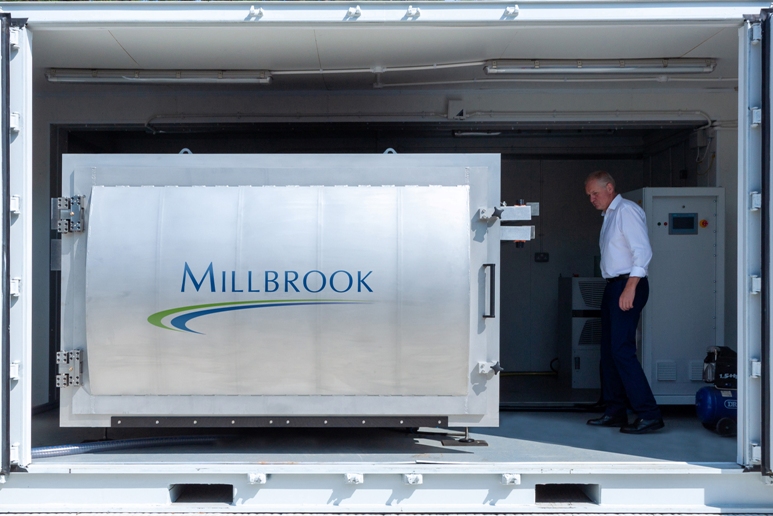Battery test facility extends capabilities with altitude test chamber capable of simulating the atmosphere of an unpressurised aircraft
With the ability to test some of the largest battery packs available for electric vehicles at altitudes both above and below ground level, the new chamber at Millbrook seeks to unlock new battery testing potential for the UK’s automotive industry.
Transport Standard
According to Millbrook, all lithium batteries must meet the UN38.3 standard test criteria before they are transported by land, sea or air.
UN38.3 is the section of the UNECE (United Nations Economic Commission for Europe) standard on the transport of dangerous goods that deals with testing methods for lithium metal and lithium Ion batteries. The section covers thermal, vibration, shock, external short circuit, impact, overcharge and forced discharge testing as well as altitude simulation. The standard was developed in response to the growing need to ship batteries in volume internationally and ensure the aviation industry can transport them safely.
Millbrook’s new Battery Altitude Test Chamber has the ability to simulate unpressurised aeroplane space at altitudes up to 15,000m. This adds to Millbrook’s extensive offering of UN38.3 tests at its Bedfordshire proving ground.
Millbrook Facility
The new altitude test facility is part of the wider vehicle engineering services provided at the Millbrook proving grounds, where the organisation provides vehicle test and validation services to customers in the automotive, transport, tyre, petrochemical and defence industries.
There is a range of test facilities for full vehicles, tyres and components located in the UK, the USA and Northern Finland. These include varied outdoor and indoor test tracks, engine dynamometers, environmental chambers, e-motor and e-axle test cells, portable emissions measurement systems (PEMS), structural test laboratories, crash laboratories including a state-of-the-art ServoSled, interior systems laboratories, battery test facilities and advanced emissions chassis dynamometers.
Last year, the UK’s biggest investment in private battery testing resulted in Millbrook opening its Battery Test Facility in September. The new Battery Altitude Test Chamber is part of the continuous growth of this capability. Millbrook can assess the life of battery cells, modules and packs; determine battery safety in a wide range of situations; and validate the performance of automotive batteries under a range of environmental conditions.
Altitude Test
During a UN38.3 altitude test, the battery is stored in the chamber at 11.6kPa for an extended period (>6 hours) to simulate the product shipping process. Following this, it is inspected against a set list of criteria. This includes checking for any mass loss, leaking, rupture or venting.
The chamber is 3.2m x 2m x 1m, meaning it can test some of the largest battery packs on the market at a variety of altitudes.
The chamber is able to test at pressures experienced also at “negative altitudes”. This adds more scope to the use cases for the test facility since the ability to set specific positive and negative altitudes means that the chamber can simulate air pressures such as those found in mountain ranges or mines, ideal for testing electric and autonomous mountain or mining machinery batteries.
“We are continuing to invest in battery testing equipment and expertise to help our customers get their products to market more quickly. This new facility is an exciting addition to our test capabilities.” Says Peter Miller, Chief Battery Engineer at Millbrook.

